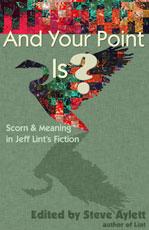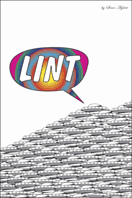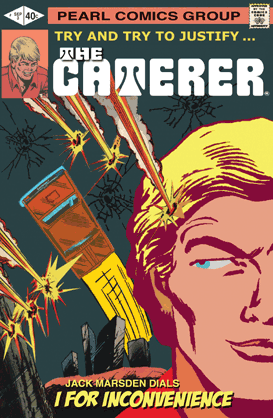from
And Your Point
 Is?
Scorn and Meaning
in Jeff Lint's fiction
edited by Steve Aylett
Is?
Scorn and Meaning
in Jeff Lint's fiction
edited by Steve Aylett
Review of
I am a Centrifuge
—
Eileen Welsome
A true hero, one who completely satisfies
our sense of independence, is a hero who is elsewhere. This hero
may not, necessarily, spring from a self-reliance background.
Jelly Result’s Valac is certainly not the child of
interesting parents. However, he, like many of Lint’s
characters, is a person who harbors no illusions about fashion
or its importance.
Certainly, Lint has created a number of characters who are less
than clever. Bobb Watts, of Turn Me Into a Parrot, is a
moron. Alger Lattimore of the play The Coffin Was Labelled
Benjy the Bear is a hen-riding, easily-surprised fool. Yet
these characters, clearly, are humorous devices designed to
heighten a sense of bafflement in the reader. (The story somehow
proceeds in such a way that the characters create the same
effects and changes that a properly-appointed Lint hero would.)
The real Lint hero, the one who appeals to us most, is
irreverent to the point of parallel-dimensionality; despite a
life of lurid extremity in surroundings such as a Dog-Angering
Factory, or toil in a mine where gas is his only friend, the
Lint protagonist will enter the tale wearing
neon pants which seem to get bigger throughout his adventures,
until eventually the other characters must acknowledge them, and
finally deal with them as the primary threat to their survival
(‘The Rustic Intensity of Benny’s Truss’). Gender is no barrier
to this syndrome; Isou of Slogan Love, one of Lint’s few
central female characters, is a study in casual scorn and
cosmically preoccupied unavailability, all external manipulation
meeting empty air.
It is
hard to find a character that fits this mold better than Surge
Brunner of I am a Centrifuge. Standing amid a society
that mimics personal power and ‘choice’ above all, he can barely
draw breath for laughing—while the constant allowances he must
make while moving through this vacuum of dishonesty has forced
the bones of his head to bulge out sideways like a faulty vase.
In a way, he is using his own skull as a sort of space helmet.
Unlike Felix Arkwitch of The Stupid Conversation, whose
deeds are quietly epic and ignored, Surge represents that
variety of hero whose rarity and weakness derives from the fact
that he is an unshakably honest and humorous man. Though the
society surrounding him is toxic, with the concepts of right and
wrong non-synchronizedly transposed so many times at so minute a
level as to be shredded, he calmly irons his pants with a warm
armadillo. In Lint’s stories it is through such a hero that we
derive a sense of moral grounding.
Much
is expected of Surge, as he is worked, taxed and exhausted like
everyone else. For Surge, this is especially poignant, as he has
been fully aware of all that has been done to him, every second
of his life from the start. This hypersensitivity, which the
refreshingly colorful Doctor Webb terms ‘common sense’ causes
such problems for Surge that he chooses to stay at the middling
pain level of his home for much of the time. Emerging into
society, Surge will sometimes begin screaming, grabbing people
and staring them in the eye point-blank as the flesh begins to
drool from his face.
More to the point is that seeing the underpinnings of the world
at all times, he finds himself to be terribly frank and
unpopular wherever he goes. People greet him only to receive a
series of ugly shocks, or badinage of such grotesque extremity
that some find their ribs have turned to a fine powder within
their chests. (Many such characters subsequently die believing
that they have been shot by a fab new weapon). As it turns out,
the centuries of exploited existence have changed the very
meaning of happiness. Eroding definitions (or in this
accelerated world, redefining by bland decree) is a queasy sport
which Lint called Memerade. Openly, blithely and uselessly
contemptuous of the society contemporary to his lifespan, Surge
achieves nothing except simple and absolute faith to himself.
And
so the stage is set. What follows is the typical Lintian
combination of obtusely-timed lethargy and pyrotechnical
misbehavior that characterize his writings. Lint’s presentation
of defiance is rich and complex. At a gala luncheon at which the
President will speak, things are tense. Surge is mostly a gentle
fellow, rarely moved to hostility or violence. However, the
sense of anticipation deriving from the knowledge that he will
presently begin to shudder and shout, clenched teeth showing
through a face streaming like hot wax, functions as the
proverbial ‘bomb under the table.’ It might be said that, of all
Lint’s social inventions, the Lintian act of effrontery is the
most fascinating and elaborate.
Sometimes, these are merely alluded to in the course of a story
as a background incident which gives us an idea of a character’s
likes and dislikes (eg. Barry Soylent’s car-torching in
Clowns & Locusts). Elsewhere they are volleys of sarcasm so
elaborate as to constitute dramatic productions (eg. Lashpool’s
forty-seven-page chicken theatre outburst at the dinner party in
Die Miami). In Centrifuge, however, Lint takes
special pains to elevate a lazily disdainful bit of jeering to
the level of masterpiece, providing it with a highly developed
structure of levels, phases and movements. The reader of the
second half of Centrifuge is witness to a renunciation blow-out,
played from start to finish with intricate play by play detail.
Through a seemingly trivial remark by another guest, the
exponential eruption of Surge’s mockery is a deceptively
impressive feat and an amazing example of Lint’s level of
concentration and dedication to his stories.
Respect for others acts as connecting thread throughout the
first half of Centrifuge. It is a trait of the docile
Surge that he gives people the credit to assess, accept or
disregard his acts and remarks. But in true Lintian fashion the
outgoing thread of respect tangles with threads of manipulation
and dishonesty coming the other way; the knot created finally
becomes such an obstruction to Surge’s peace that he must
explode into a nova of derision to burn it away.
Like
Doomed & Confident and countless other Lint novels, I
am a Centrifuge gives us a glimpse of honesty which sparks
briefly within a society very like our own, before being snuffed
again by the vacuum. Clearly it’s no mean feat for an author to
fill half of a good-sized novel with a stream of
intricately-demonstrated verbal abuse but Lint makes it a
fertile paradise of colors, giving Surge’s logic an entire
anatomy including bellowing lungs which, like all good satire,
are powered by the flawed arguments of its target. The guests,
for some time frozen like deer in the headlights, eventually
attempt to escape but find the ballroom closed off by their own
assertion that Surge has nothing to do but tolerate their dismal
company. (This and a couple of other elements have been compared
to Stephen King’s Carrie, which was published the same
year).
Finally the visible twists and clots of manipulation are hanging
in the air over the shrieking assembly and dripping noxious
slurry upon all. But Surge has efforted so much beyond himself
that, when he incinerates the terrible mass in mid-air, he
destroys the mechanism of complex truth within him. Something in
him is also purified away and he is left a simpleton, unable to
explain himself or anything else. The bedraggled guests stagger
from the building in a daze, including a wealthy dowager whose
mouth has disappeared. The evening’s vortex becomes an urban
myth, of course.
The
concept of Surge’s long-contained eruption is a perfect Lintian
excuse for mischief. In the early Random publication of I Am
a Centrifuge, the cover art offers us an interesting
representation of Surge blowing some kind of galaxy out of his
ass. Behind him are primly affronted characters representing the
gala guests, some of them throwing their entire arms across
their eyes (which seems excessive). Though an inaccurate
representation, anyone who saw the cover and who knew Lint’s
work, should have suspected at once that he was the creator of
Centrifuge, as opposed to Alan Rouch, whose name first
graced the cover. Rouch’s Sadly Disappointed, on the
other hand, is an average sort of a book to which Rouch has
added a few hens in the hope of seeming ‘wacky.’ Though
misguided in swapping books with his friend Rouch, Lint should
be given credit for trying to help out the lesser author.
EDITOR’s NOTE: I am a Centrifuge, published under Alan
Rouch’s name in 1974, is generally agreed to have been written
by Jeff Lint. Around the same time, the would-be ‘demonic
possession’ thriller Sadly Disappointed was published
under the name Isaac Asimov, the implication being that it was
written by Lint. Alan Rouch has since admitted to writing that
piece of garbage.












